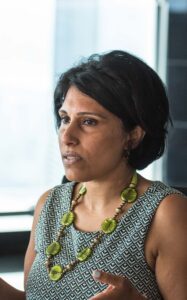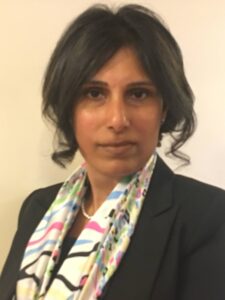Behind every successful organization is a passionate team whose members are aligned in goals and vision, and are generous about contributing their cognitive diversity. The FSI team is precisely such a team. We are a team of talented and experienced individuals, who share the values of the Shared Impact Philosophy to help the people who help people.
Recently, we’ve spoken to experienced economist, Sanjukta Mukherjee, currently a Foundation for Shared Impact director. Read our interview with Sanjukta to learn more about her career, her work at FSI, and her insights on creating more diverse and inclusive workplaces.
Where are you originally from? When and why did you come to Hong Kong?
I am from India. Our family arrived in Hong Kong in 2010 from Moscow, Russia, where my husband and I were employed. Our family is quite international and Hong Kong is my fifth international relocation. We used to live here prior to moving to Moscow and returned to Hong Kong as a family for a new adventure.
Can you tell me more about your previous and current work?
I am an economist and leverage data and analysis to improve policies, programs, outcomes across the multi-laterals and private sector. When I used to work for the multi-laterals, my technical expertise centered on econometric modeling (data science, programming) and writing of empirically-driven policy positions of a broad range of development indicators (including ESG topics) such as poverty reduction, child labor, income inequality, gender inequality, diversity and inclusion.
In my current role, I lead the Asia-Pacific insights development that creates market demand and broadens the regional economic engagement.

How did you get to learn about Foundation for Shared Impact (FSI)? How did that lead to your current role as director?
I attended the Community Connections Program’s Connection Session in 2017, where I met FSI. Our alignment of values became very clear. I was initially invited to be part of the Advisory Board for a few months. I also attended the Director training program offered by FSI and after demonstration of my skills-based contribution that aligned with the Foundation’s needs, I was invited by the co-founders to join formally as a Director.
What is your take on social impact? In the work you do and in your personal life, how do you try to make a positive impact?
My primary driver of engagement has always been the greater public good. My take on positive impact is that generating a positive impact is not necessarily enabled by policies. The main driver of positive impact is culture and transformational mindsets and we are all empowered to make a difference in our own personal and professional spheres, regardless of titles and hierarchies.
Generating positive social impact in my personal life takes the form of giving my business to women-owned enterprises, encouraging women to become economically/financially empowered and encouraging them to find and use their voice. When I spend my time and money, I prefer to do it in charitable ways, for example to non-profits and socially disadvantaged people. In my professional life, the same principles hold true. I mentor and sponsor women for progress and promotions in their career, give them opportunities for stretch assignments to facilitate their growth, and support and develop their ability to hold difficult conversations.
How would you describe your experience as the mentor of the women on the FSI team, providing them with invaluable advice?
Empowering everyone around me through sponsorship, mentorship, counseling has been my primary driver of engagement. Mentoring young women or men, to open minds and doors, and encouraging them to see possibilities instead of limitations, is energizing for me.
 What do you think can and should be done to create more diverse and inclusive, and healthier workplaces?
What do you think can and should be done to create more diverse and inclusive, and healthier workplaces?
We can have healthier workplaces when there is empathetic leadership, cognitive diversity, that uses evidence to recognize a problem, invites diverse perspectives, and takes resolute action to make progress towards a solution. Existing systems cannot be improved and strengthened by speaking in an echo chamber and ignoring diverse viewpoints that disadvantage certain segments of society. In these complex times, with myriad challenges, diverse inputs and multi-disciplinary perspectives are critical to reach balanced and judicious solutions that cater to, and honor all kinds of realities.
Workplaces can prescribe policies for equal opportunities, transparency, and accountability, however, policies have their limits. Culture is the enabler and transformational mindsets are drivers of positive change. Every single one of us has opportunities on a daily basis to be inclusive, to be advocates against biases to reduce disparities wherever we encounter them.
You believe in using data and empathy to drive better outcomes – can you elaborate on that?
Data helps with defining the problem and while meaningful data can be the bedrock of decision-making, data and tech are not panaceas in driving impact and systems change. In this day and age, we have sufficient empirical data, evidence, and technology to achieve better outcomes but symbolic words with no serious action won’t improve outcomes. In order to enact meaningful change and improve outcomes, we need empathy and ownership of the problem and we need to be able to move from intent to coordinated, strategic action to begin to find solutions to improve outcomes.
What do you do for self-care?
I prioritize walks and swims. While I am not a frivolous person, lately I find myself escaping into frothy shows.
*Acknowledgment: This interview was conducted and written by Samiya Sainur, an Impact Lab intern of the FSI Communications and Marketing team.




